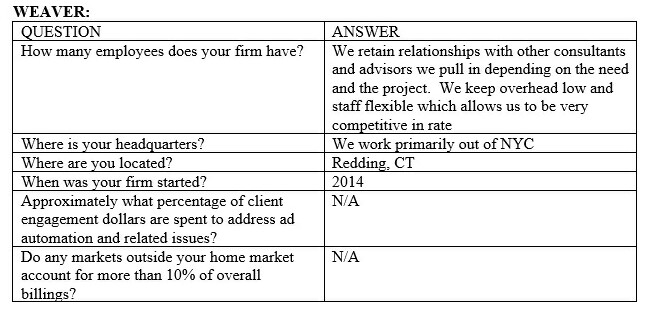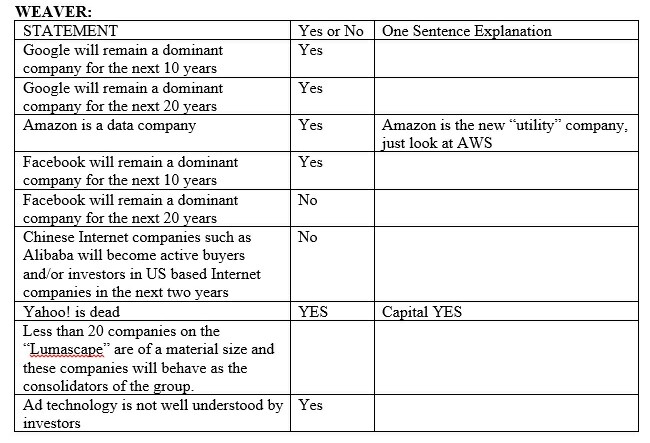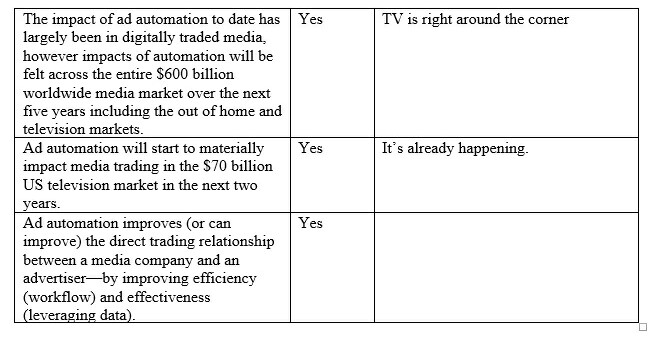Joe Weaver of Promatica Consulting: The Ad Automation and Programmatic Confidantes

In a series of conversations with the leading confidantes and consultants in the ad automation and programmatic area, Jay Sears, Senior Vice President Marketplace Development of Rubicon Project, discusses trends and issues of the day impacting advertisers and media owners. Here, Sears speaks with Joe Weaver, President and CEO of Promatica Consulting. Prior to Promatica, Weaver was Managing Director of WPP’s Mindshare trading desk. He was responsible for developing and activating the industry’s first transparent programmatic framework for enterprise brand marketers.
JAY SEARS: What do you read to keep up with politics, art and culture?
JOE WEAVER: For general news, I’m a Fox News and CNBC fan. Also, I read The Wall Street Journal and The New York Times.
SEARS: What do you read to keep up with friends?
WEAVER: Facebook and LinkedIn
SEARS: What do you read to keep up with the advertising technology industry?
WEAVER: Hmmm, honestly I get industry news anxiety … In this business and from our vantage point you always have to read everything. A lot of it is crap. Being an insider, you start to understand why stories are published, who they came from and what the strategic goal was in placement. Industry news and those outlets can be very deliberate so it’s important to know the source. For the most part, I use Flipboard or Feedly for an aggregated news feed of curated topics. They’re great platforms because they can be accessed across different devices.
SEARS: What’s your favorite commercial of all time?
WEAVER: I wouldn’t call it a favorite but think creatively it was ahead of it’s time for online video. It’s a Cadillac commercial from 2007 promoting the V series going from 0-60 in five seconds. The spot is only 5 seconds. Take a look.
SEARS: With regards to advertising automation, what are the three biggest trends you expect to impact companies in 2016?
WEAVER: All of these responses are a direct result of advertising automation and technology.
- Agency / Client Relationships. The agency world has changed and not for the better, as if it could get any worse. The issues run deep from rebates, transparency, client trust issues, new digital and data focused skillsets, etc. Some agencies are downright delusional about how much things have changed and what they intend to do about it. While they reflect and ponder, there is a groundswell of new marketing services companies and consultants quietly winning valuable pieces of business that fill current organizational gaps and services.
- Massive Shift in Required Skillsets. There is an immediate need for advanced digital capabilities in media, data and technology. This concept is nothing new, however in order for advertising automation to continue growing these skillsets are essential. The Gulfstream is on the tarmac; we just need pilots to get it in the air. Wheels up!
- On-Going Technology Consolidation. This has been said before so it’s no surprise, but I think that ad-technology companies will continue to merge together where appropriate.
SEARS: With regards to advertising automation, what are the three most overblown topics that you wish would just go away?
WEAVER: Today I only have one. There is mass confusion around “guaranteed viewability” amongst agencies and brand marketers. Brand marketers are demanding increased levels of viewability across their media spending, with a particular focus on driving unjustifiable levels in digital media. In response, some agencies and tech vendors have productized “guaranteed viewability” levels but stop short in explaining how those levels are achieved. For clarity, guaranteeing all impressions purchased will be viewable is not technically possible, unless of course you’re Merlin the Magician. If you’ve been sold this approach, you’ve been lied to.
SEARS: Describe your firm and then tell us the three most common issues you help clients on with respect to advertising automation and programmatic trading.
WEAVER: Promatica is a boutique marketing services company focused on supporting brand marketers in navigating the programmatic marketing landscape. We’ve worked with clients like L’Oreal and Johnson & Johnson to develop and activate transparent programmatic frameworks to achieve business goals. Everything is customized and proprietary. A few years ago, I built one of the first transparent programmatic platforms for Unilever and Kimberly Clark. Yes, it’s the one you read about all the time.
We focus on infusing transparency into new and existing programmatic models. That’s where most projects start. From there, we dive into programmatic framework, technology evaluations, data strategy, financial governance, systems integrations and contractual review, and provide a substantial amount of education and on-going training. We also work extensively with ad technology vendors across sales, marketing, and product development.
SEARS: Tell us about your firm:

SEARS: What are the most common issues you help clients on regarding automation?
WEAVER:
- Transparency
- Technology
- Education/Training
SEARS: The majority of ad technology companies have struggled (relatively small, unprofitable or both). Of the poor performers, what are the commonalities between them that have contributed to this weakness?
WEAVER: I think there is a lack of focus and understanding in how to approach and pitch agencies and brand marketers. Most of the “stories” sound the same from vendor to vendor. We can do anything and everything. End of day, tech is challenging to sell to an audience with limited technology backgrounds. Know your audience! You are selling to media people. When’s the last time you met a media planner who understood Python or JavaScript or knew how to write a SQL query. Most media people don’t understand technology and therefore can’t make educated decisions about how to select the right partner. It’s not all the vendors fault, but there are ways to tell the story creating obvious differentiation that ties back to business goals.
SEARS: A smaller handful of ad technology companies has achieved scale and performed better than the rest. What are the commonalities between them that have contributed to this relative strength?
WEAVER: First, I think successful companies are doing the opposite of the above. Second, I think prospecting and qualifying are really critical. There isn’t a ton of time devoted to understanding who you are trying to pitch and what their needs are. This allows sellers to tailor the message for each meeting. No seller should use a canned presentation and no seller should ever use the same presentation twice. Tailor, adjust and customize. Finally, I think successful companies are doing what you say they’re going to do. They promise and over-deliver. This creates trust and credibility, something that is lacking in today’s marketplace.
SEARS: Do we live in a “tale of two cities” where Google and Facebook win almost everything, advertisers are dictated to and other media companies fight for the scraps?
WEAVER: I’m sure everyone’s experience is different but over the past few years Google and Facebook have developed an attitude of entitlement. They believe they should get meetings and close deals because of who they are regardless of what they offer. I think we saw Google take an aggressive position this year when they pulled all YouTube inventory access out of DSPs except for DoubleClick Bid Manager. Definitely a defensive move based upon their lack of success in gaining traction selling against other DSPs.
SEARS: Please answer the following statements yes or no.


SEARS: If you could go to the airport right now with friends or family and fly anywhere in the world for vacation, who would you take and where would you go?
WEAVER: Simple answer: I would take my wife to St. Thomas or St. John and sit on a beach for a few weeks.
SEARS: If you could create an endowment to fund any existing non-profit you designated, what lucky non-profit organization would that be?
WEAVER: The American Cancer Society.
SEARS: What is your favorite restaurant in the world?
WEAVER: Love a steak at Del Frisco’s … business lunch!
SEARS: Thanks, Joe!
Do know a leading ad automation consultant in the ad automation and programmatic area advising advertisers and media companies that Sears should consider interviewing?Tell him.
The opinions and points of view expressed in this commentary are exclusively the views of the author and do not necessarily represent the views of MediaVillage.com/MyersBizNet management or associated bloggers.


